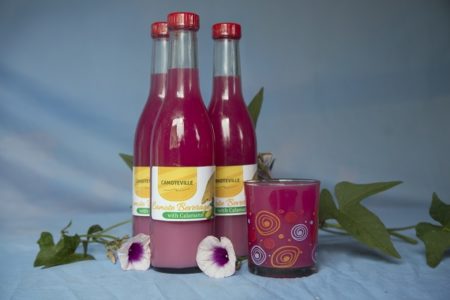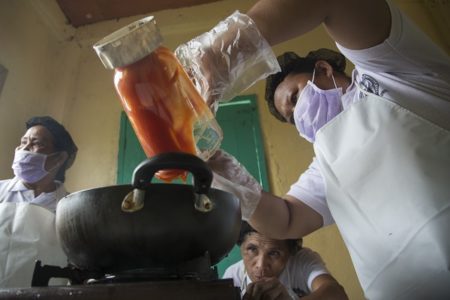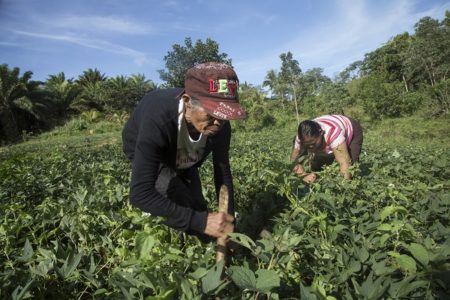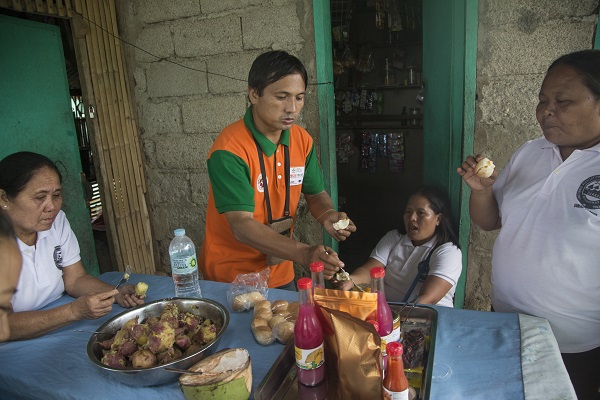Once considered a survival food during times of drought or severe rains, sweetpotato cultivation is quickly turning into a lucrative business opportunity for entrepreneurial farmers while promoting forest conservation in the process. In a swath of the Philippines where the forests offer a buffer against the damage posed by severe storms, a staggering poverty rate of 46.9 percent threatens to drive deforestation for farmland. The Integrated Natural Resource and Environmental Management Project (INREMP), led by the Philippines Department of Environment and Natural Resources, thus incorporated the creation of income opportunities into their conservation work.
“You want people to be stewards of nature, but the people need to eat, people need money,” says International Potato Center (CIP) Research Assistant, Guada Babilonia. “For them to be good stewards and protect the forest, they need to have alternative livelihoods.”
INREMP distributed highly-profitable fruit trees to plant as a buffer on the outskirts of the forest and promoted sweetpotato cultivation amongst the saplings as an additional source of income. This root crop grows well in the region, but limited knowledge of how the market works coupled with difficulty getting harvests to potential consumers, stripped sweetpotato of its power to fuel businesses. In response, INREMP built connector roads to make it easier to access markets and turned to the Farmer Business School (FBS) approach for transforming rural farmers into key players in the sweetpotato value chain. FBS was introduced by CIP in partnership with INREMP under the Food Resilience Through Root and Tuber Crops in Upland and Coastal Communities of the Asia-Pacific (FoodSTART+) project, generously funded by the European Union and the International Fund for Agricultural Development (IFAD).
From barter to business, sweetpotato farmers go professional

At the heart of the FBS model is a participatory learning approach that emphasizes the entrepreneurial role that smallholder farmers can play in local markets. Traditionally, middlemen are the connection between business owners and smallholders, with little or no communication between people on either end of the value chain.
Relying on the strength in numbers, FBS facilitates the formation of producer groups that can pool resources. “Farmers forming groups to market their commodities really help to bring the volume up,” said Babalonia. “This allows them to approach the markets, traders and retailers with more bargaining power, because they now have the volume the market wants.”
Participants learn marketing and branding and are provided with basic recipes they can make with sweetpotato products. Through a series of market visits the farmers learn to assess the going-rates for their crops, identify gaps for their own product lines to fill and develop vital relationships with other market players.
Throughout the course, groups come up with their own business strategy and develop pitches for their product lines that they present during their graduation ceremony from the program, which doubles as a business launch.
In less than a year, one FBS group, Camoteville has completely transformed its approach to sweetpotato farming. “We used to barter with our sweetpotato or use it to feed our animals,” said Elizabeth Timblaco, the group’s business manager. Now the women know how to select for quality and add value to their harvests by processing their sweetpotatoes and creating product lines that are in demand.
Inside Camoteville Headquarters
A piece of propped up cardboard in the frame of an open-air window blocks the breeze in the Camoteville communal kitchen. With a flick of a match and a rush of propane the burner flames to life. Timblaco monitors the rise in heat with a digital thermometer. When the oil reaches the right temperature one of the cooks pours in the thinly sliced chips that sizzle as they fry. While two women of the 16-member group sterilize bottles outside, others get to work on peeling, chopping and blending their line of ketchup, juices, jams and chips.

The women use large metal ladles supplied by INREMP as part of their business starter kits to swap in raw potatoes for crisp chips. While limited in resources they make up with innovation— two old sharpened knife blades attached to a thin piece of plywood serve as a makeshift slicer to assure consistency in the width of their chips.
“Before the project, we only knew how to boil sweetpotato and how to make camote cue (caramelized sweetpotato),” said Timblaco. “(Through FBS) we learned that sweetpotato can be made into lots of products like ice cream, cupcakes and flour. For now, we’re focusing on four products, but we want to expand our lines.”
Bright pink juice with a dash of citrusy calamansi, deep rogue-colored ketchup and bright orange jams are heat sealed in boiling water. Crisp chips are weighed and poured into eye-catching metallic gold bags. The finishing touch— their tell-tale labels branding them as Camoteville products.
For now, the group is manufacturing on a per-order basis but hopes to expand soon. They already supply the nearby adventure parks, where tourists zipline over forested canopies, and sell at local schools. To assure a consistent supply of their main ingredient, Timblaco has organized the group to take shifts growing sweetpotato year-round, with members growing on the marshiest land tasked with planting during the driest seasons.
Growing businesses, thriving forests

Under the careful guidance of their FBS facilitator, Joseph Capin, the group has learned not only the best practices in food safety, they’ve also learned to organize and innovate to offer the best possible products to the market. The group meets weekly to assess needs and challenges. Sourcing supplies such as bottles can be costly in the Philippines which is made up of more than 7,000 islands. Until now they’ve had to purchase from nearby Cebu in small quantities, but as they grow— they’ve negotiated lower prices at larger quantities to be shipped from the capital, Manila.
While CIP developed the FBS methodology, its facilitators such as Capin replicate the model throughout the region under INREMP’s supervision. As a commodity-neutral program, FBS gives farmers the knowledge and tools they need to connect to markets and identify opportunities, and it allows government programs to incorporate it into their own goals.
Maria Lorena Castino, INREMP regional focal person, credits the program with giving them the tools they need to support farmers in developing new businesses and conserve the forest in the process. “We are foresters,” she says. “We are focused on tree planting. We don’t have the experience to help people organize their businesses. With FBS, farmers get the knowledge they need to earn some income from root crops and related products rather than cutting down trees.”
For enterprising farmers like Timblaco, those benefits trickle out far beyond the products they sell. Demand for sweetpotato is up and Camoteville farmers have found increased farmer interest in purchasing their vines and this has opened up new market opportunities. What was once used as pig feed is now fetching them a handsome 25 pesos per kilo on the open market.
Farmer Business Schools are part of the FoodSTART+ project which is implemented by the International Potato Center in collaboration with the International Center for Tropical Agriculture (CIAT), within the framework of the CGIAR Research Program on Roots, Tubers and Bananas, and is funded by IFAD and the European Union.

